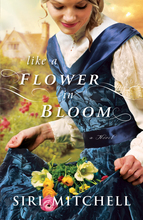 Set in England in the mid-1800's, when botany suddenly became a manly, scientific profession, Like a Flower in Bloom focuses on what happened to the women, whose contributions to the of the field of study were largely ignored.Charlotte Withersby is every bit the professional botanist her father is, yet society refuses to honor her publications unless they are submitted under her father's name. However, Charlotte has been happy to help - and largely complete - her father's work, until her well-meaning uncle brings up the idea she should be married. Her father agrees with the notion, and when one of his correspondents from New Zealand shows up to act his assistant, Charlotte is booted out into the incomprehensible world of society. Hoping that a real threat of marriage will make her father see how much he needs her, she accepts her new role, though not without mishaps. And when proposals do come, what will she do?
Set in England in the mid-1800's, when botany suddenly became a manly, scientific profession, Like a Flower in Bloom focuses on what happened to the women, whose contributions to the of the field of study were largely ignored.Charlotte Withersby is every bit the professional botanist her father is, yet society refuses to honor her publications unless they are submitted under her father's name. However, Charlotte has been happy to help - and largely complete - her father's work, until her well-meaning uncle brings up the idea she should be married. Her father agrees with the notion, and when one of his correspondents from New Zealand shows up to act his assistant, Charlotte is booted out into the incomprehensible world of society. Hoping that a real threat of marriage will make her father see how much he needs her, she accepts her new role, though not without mishaps. And when proposals do come, what will she do? Overall, I found it a delightful, amusing read with a tongue-in-cheek sort of humor that put me in mind of Jane Austen. Given their personalities and the style in which they were portrayed, many of the characters - Mr. Trimble, Miss Templeton, the Admiral, Mr. Hopkins-Whyte - felt like they could be from a Jane Austen novel; not that they were in any way replicas of her characters, but they would fit right in.
Having an interest in botany myself, I particularly enjoyed the theme of the book, and I was quite proud to know what they were talking about when such terms as Ranunculus (buttercups) and Pseudorchis (small white orchid) came up. However, I do not think it is overwhelmingly technical for those who have not studied the subject. It was fun to learn about the practices of Victorian-era botany, and how professionals went about it, especially as opposed to the people who pursued it because it was a fashionable hobby of the time.
I really liked Mr. Trimble, who is far more than what he seems. Or far more than what Charlotte notices. I wish we could have seen a little more of her interaction with him, especially after her disasters in courtship. Charlotte's anger at him is rooted in feelings of rejection, and, while it may not be just, it's understandable that she wants to lay the blame for her hurt somewhere. How often do we ourselves lash out when in pain?
Delving into issues of self-worth, introversion, and dreams, the author writes a well-rounded story of both serious subjects and humor. 4.5 stars!
Thank you Bethany House and NetGalley for providing an e-copy for review; I was not required to make it positive, and all opinions are my own.
No comments:
Post a Comment